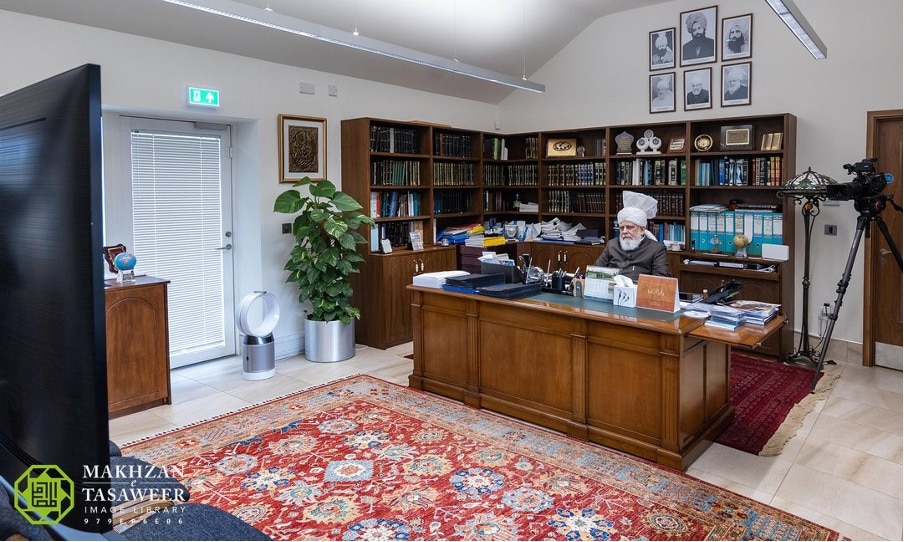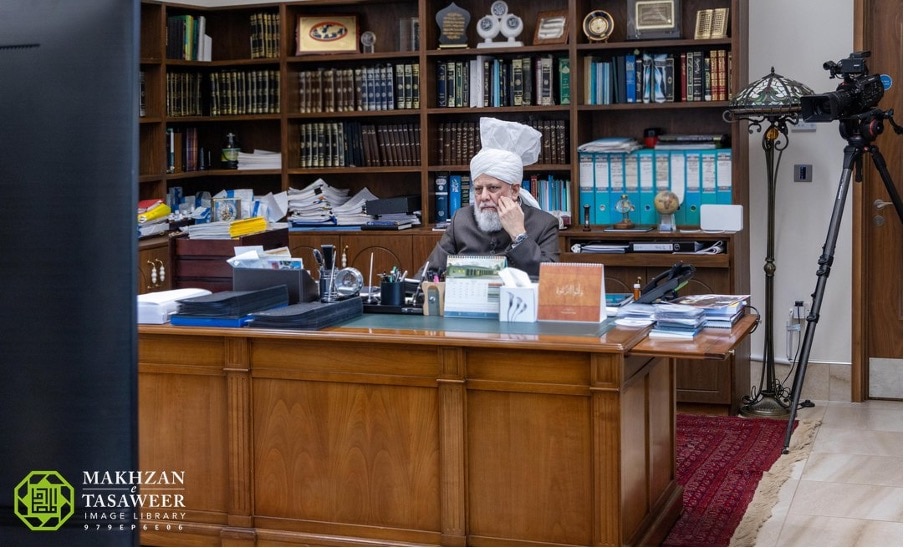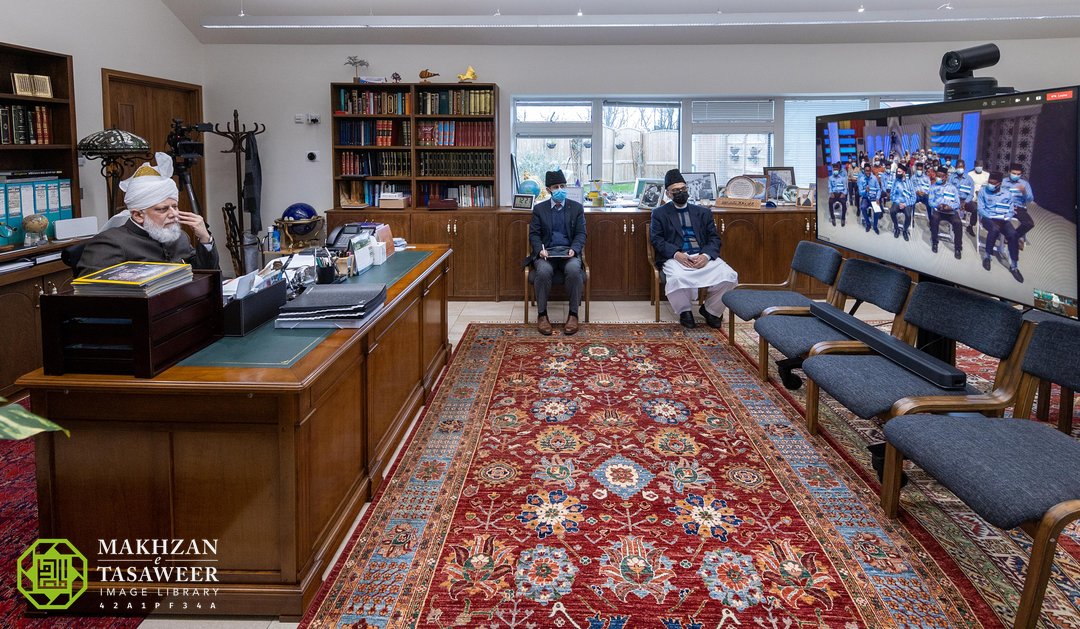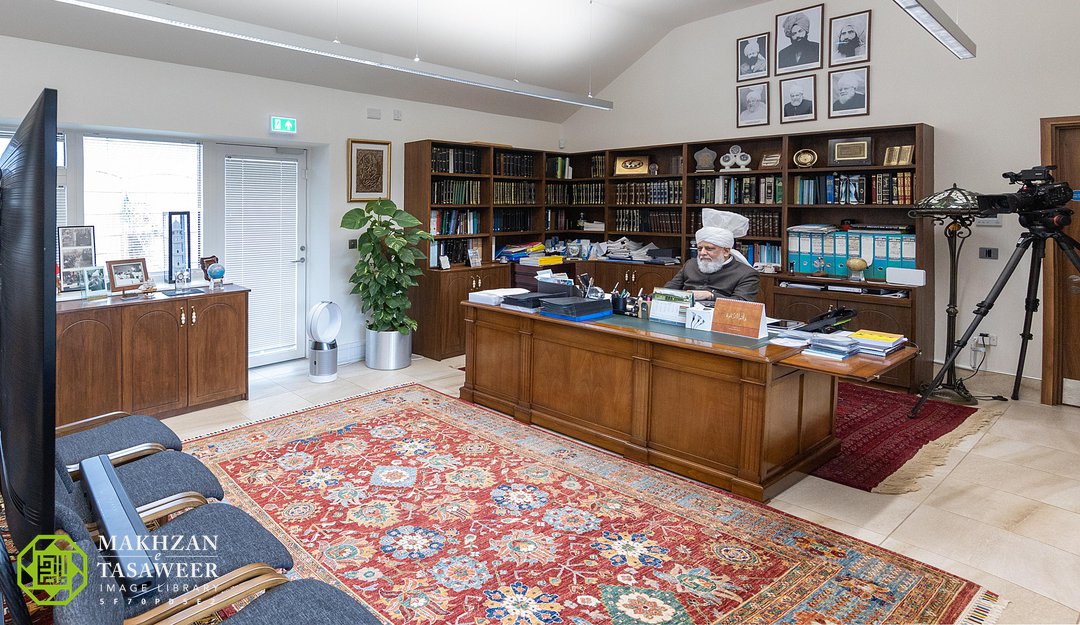
Members of Nasirat-Ul-Ahmadiyya Australia Have Honour of a Virtual Meeting With The Head of The Ahmadiyya Muslim Community
His Holiness gives guidance on a range of contemporary issues affecting young people in society
On 21 March 2021, the World Head of the Ahmadiyya Muslim Community, the Fifth Khalifa (Caliph), His Holiness, Hazrat Mirza Masroor Ahmad held a virtual online meeting with over 40 members of Nasirat-ul-Ahmadiyya (Ahmadiyya Muslim Girls Association) from Australia aged between 13 and 15.
The event started with the recitation of the Holy Quran, followed by a saying of the Holy Prophet Muhammad (peace and blessings be upon him) and an excerpt from the writings of the Promised Messiah (peace be upon him) and a poem.
For the rest of the hour-long meeting members of Nasirat-ul-Ahmadiyya had the opportunity to ask His Holiness a series of questions regarding their faith and contemporary issues.
In response to a question about how to manage the balancing of school studies and religious education, Hazrat Mirza Masroor Ahmad said:
“You should spend most of your time on what you are studying in school and one hour, or even half an hour, is enough for you to do the Nasirat [religious] course or to read any of the Islamic religious books… So, spend two to three hours or however much time is necessary for your school homework to be completed and then spend at least half an hour to one hour to do your religious studies and that is enough. Then you can easily do justice to both of your school and Islamic studies.”
One of the attendees asked His Holiness what he likes to eat for the morning and evening meals during Ramadhan.
Hazrat Mirza Masroor Ahmad said:
“Whatever I usually have for breakfast, I have that in my morning meal during Ramadhan and whatever I usually have for supper, I have that for my evening meal of Ramadhan. As it was the practice of the Holy Prophet Muhammad (peace and blessings be upon him), I eat a date before the evening meal. Other than that I do not eat lavish things people generally have like samosas, pakoras and chaats or other unnecessary dishes. I do not like to eat so much that I would be uncomfortable after the evening meal and even struggle to wake up in the morning for the fast. So a simple routine should be kept.”

Hazrat Mirza Masroor Ahmad further said:
“As a society we have made it a tradition that we must certainly eat something special during the morning and evening meals of Ramadhan. We unnecessarily end up increasing expenditure. On the one hand, food expenditure increases unnecessarily and on the other hand, your stomach also becomes discomforted and the entire day you spend feeling lazy. The true enjoyment of the fast is when you maintain your normal diet and you begin and break your fast in a simple way and the money you save by not eating lavish foods should be donated to charity.”
Another member of Nasirat-ul-Ahmadiyya asked a question regarding righteousness in relation to a Hadith (saying) of the Holy Prophet Muhammad (peace and blessings be upon him) which states, ‘This world is a prison for the believer and a heaven for the disbeliever.’ She asked whether enjoying worldly things despite fulfilling all religious duties means that such a person is not righteous enough.
In response, Hazrat Mirza Masroor Ahmad said:
“The Hadith means that a righteous person does not like or value worldly things more than their religious teachings, practices and religious rights… It means that those people who think that this world is everything and so forget about their duties due to Allah the Almighty, then, although in their eyes the world may be a paradise, but not in the eyes of Allah the Almighty.”
Hazrat Mirza Masroor Ahmad continued:
“Conversely, a person who always discharges their duties towards Allah the Almighty and fulfils his duties towards his fellow beings and he follows all the commandments of Allah the Almighty, people may think that this world is a prison for him, but Allah the Almighty says that such a person is actually making a paradise for themselves in heaven in the hereafter. So you may enjoy worldly things but, at the same time, ensure you prioritise and discharge the duties owed to Allah the Almighty and follow all the commandments which He has given.”
One girl asked what arguments may be given for proving the existence of God to her fellow students at school.
His Holiness said that personal experiences regarding the acceptance of prayers should be shared with those who are sceptics of religion and non-believers.
His Holiness enquired if any of her prayers had been accepted by God Almighty and she replied that they certainly had.
Upon this, Hazrat Mirza Masroor Ahmad said:
“You should tell your friends that ‘I prayed to Allah the Almighty and He accepted my prayer. That shows that Allah does exist.’ You should also read the book Our God where you can find many proofs about the existence of God and then you should also read the book by the Second Caliph of the Ahmadiyya Muslim Community, ‘Ten Proofs for the Existence of God’. The main thing is you present your own example that, ‘I am a believer, true believer in God and when I prayed to God, Allah the Almighty accepted my prayer and that further strengthened my faith in Him.’”
One of the members of Nasirat-ul-Ahmadiyya asked about the wearing of a headscarf.
Hazrat Mirza Masroor Ahmad said:
“If other people ask you why you wear a headscarf, you can tell them that the basis of our religious teaching is modesty and we should always be in a modest dress and covering one’s head is part of the modest dress. This is why Christian Nuns used to wear a scarf in the olden days and even now in the churches. This shows that they also realise that wearing a scarf is a part of modest dress. This is why we wear it.”
One of the participants asked how they should deal with high school stress and how to study effectively.
In response, Hazrat Mirza Masroor Ahmad said:
“Whatever you are going to study the next day, read it at home before and then when you are listening to the lecture of your teacher it will be very much easy for you to understand. When you come back home revise it again. Then it will not stress you much… Also pray to Allah the Almighty. During your prayers pray to Allah the Almighty that He makes your work easy for you.”
His Holiness mentioned that students should pray in the five daily prayers for success and this will grant them peace and reduce their stress and anxiety. Furthermore, His Holiness particularly mentioned two prayers that should be recited regularly mentioned in the Holy Quran in chapter 20 verse 115 and chapter 20 verses 26 to 29.
One of the Nasirat members asked why God Almighty did not forbid the consumption of alcohol before Islam as it is known to be harmful for human beings.
Hazrat Mirza Masroor Ahmad replied:
“Before Islam, in Mecca, people used to drink alcohol without any restriction and would often be drunk but even then, there were some people who did not like alcohol. They used to think even before Islam that alcohol is not good. This is why they never drank it… So it means there was a concept even before Islam that alcohol is not a good thing and it can harm you.”
Hazrat Mirza Masroor Ahmad further explained:
“Later on, the teachings of Islam were revealed to the Holy Prophet Muhammad (peace and blessings be upon him) and commandments were given about each and every thing and so Islam became a perfect religion. God Almighty said that those things which can have a negative effect upon a person, even a small amount should not be used. This is why there is a clear commandment in the Holy Quran that we should not drink alcohol because it makes a person lose their senses and so they cannot concentrate on their worship and prayer and even their day to day dealings with others are badly affected.”
One of the attendees also asked what the best way is to convince a non-Muslim that burying a dead body is more respectful than cremation.
His Holiness said that, according to Islam, the best practice is to cover a dead body in a cloth and to bury it in a coffin. At the same time, His Holiness said all people should be respectful of the religious practices and traditions of one another, rather than seeking to ignite division and conflict by highlighting each and every difference and condemning one another’s beliefs and practices.
Hazrat Mirza Masroor Ahmad said:
“Every religion has their way of giving respect to a dead body and burial is the way Islam teaches. If we don’t argue and say something ill about the teachings of others, why should they argue and say something negative about our religion or raise objections on our religion’s teachings? You should say ‘Instead of arguing over these matters, we should live amicably and leave aside each other’s traditions. We should respect each other.’ This is the best way of living together.”
During the meeting His Holiness was also updated about the severe flooding affecting Australia and particularly New South Wales. His Holiness prayed for the safety and wellbeing of all the people affected.

